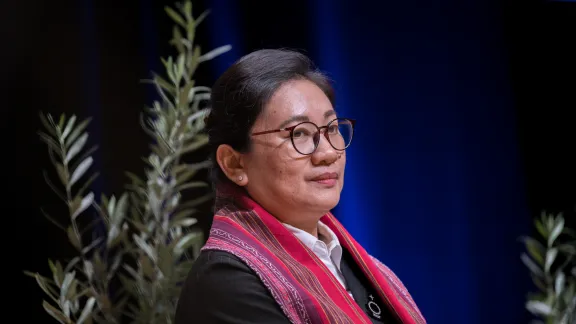15 SEP 2023
Indonesian theologian urges Assembly delegates to promote unity by practicing hospitality
(LWI) - As a communion of churches, we are called “to keep the Body together, be it the unity of churches, [or] be it defending human bodies from violence and dominance.” In the first of three plenary sessions exploring the theme of The Lutheran World Federation (LWF) Thirteenth Assembly, “One Body, One Spirit, One Hope,” Indonesian theologian Rev. Dr Benny Sinaga spoke about the many ways in which human bodies are broken and suffer from hunger, conflict, discrimination, and oppression.

Indonesian theologian Rev. Dr Benny Sinaga, delivering the keynote presentation on “One Body” during the thematic plenary session of the third day at LWF’s Thirteenth Assembly in Kraków, Poland. Photo: LWF/Albin Hillert
Speaking on day three of the 13 to 19 September Assembly, Sinaga, a New Testament scholar and President of the Sekolah Tinggi Biblevrouw theological seminary for women in North Sumatra, reflected on what it means for the churches to be called into the one, undivided body of Christ through the work of the one Holy Spirit. “The Spirit of God is one; the church, therefore, must also be one; it is unthinkable that it could be divided,” she said.
Yet, every day, she continued, “we find and experience brokenness through war, injustice, violence, polarization, discrimination, hate, hunger.” She pointed to the nearby Auschwitz-Birkenau memorial and museum, which Assembly participants are visiting, but also to contemporary horrors such as the conflict in neighboring Ukraine.
If some parts of this world are hungry, then the world be sick.
Rev. Dr Benny Sinaga, President of the Sekolah Tinggi Biblevrouw seminary in North Sumatra, Indonesia
Child malnutrition and hunger in countries such as Chad, Congo, Haiti, Madagascar or Yemen are also scourges afflicting so many bodies, causing sickness and suffering in poorer parts of the world today, Sinaga said. “If some parts of this world are hungry, then the world will be sick,” she warned.
Speaking of the COVID-19 pandemic, she recalled the way in which the virus “tortures the spirit, the breath, the lungs,” and has killed millions of people, leaving families and churches bereaved and crying. From this experience, she said, “we understand more how to value the air which is inhaled and exhaled every second of the life in the body, to value the meaning of the family and the church worshipping together as the fellowship in one body, and to value those who are always taking care of us.”
Building equality, inclusion, unity
Sinaga also noted the way people continue to be excluded and suffer discrimination on grounds of skin color, economic status, education and gender. In her own country, Indonesia, she said “some women (and also men) prefer buying skincare whitening” because they worry about being rejected or looked down upon. She urged delegates from the 99 countries where LWF is present to greet and get to know each other, to build and strengthen relationships, not just during the Assembly in Krakow, but also afterwards when “we fall back into our regular or usual tasks.”
As a young female pastor, Sinaga pointed to the way women continue to suffer from violence, discrimination, subordination, lack of access to healthcare or participation in political life. But she also noted the progress achieved in her church, the Protestant Christian Batak Church (HKBP), founded by German missionaries in the 1860s. At her seminary, women are trained as preachers and leaders, while the church ordained its first female Batak pastors in 1986. More than two thousand women have now been ordained to various ministries including pastors, preachers, deaconesses, evangelists and elders.
Sinaga urged participants to promote equality, inclusion and to build up the unity of the body of Christ by practicing “hospitality as a virtue to welcome others.” Recalling the way “Jesus welcomes every sinner to have a banquet at His table,” she said, “the cross is the self-giving of the one for many.” She concluded: “Unity of the body is a fruit of Christ’s self-sacrifice which breaks down enmity, discrimination, rejection, polarization, war, inequality, hate and injustice.”
Responses from South Africa and Germany
Responding to this first thematic presentation, South African Bishop Naledzani Josephine Sikhwari of the Evangelical Lutheran Church in Southern Africa (ELCSA) talked about the many different ethnicities and languages that make up her church. “ELCSA is diverse due to culture, language, ethnic groups, as well as the background of the missionaries who brought the gospel to Southern Africa,” she said. “Unity is not easy within ELCSA but in diversity we strive for the gospel,” she added. Working for unity in one body, she stressed, requires “inclusivity,” “integrity” and “treating each other with dignity.”
German Professor Dr Bernd Oberdorfer from the University of Augsburg also offered a response, reflecting on the Shoah, during which the bodies of Jewish men, women and children were burnt “to extinguish any traces of their existence.” Though the Shoah was not initiated or conducted by the church, he noted, the antisemitism of the Nazis was built “on a long history of Christian anti-Judaism which was still widespread in the Christian congregations of the early 20th century.
Thus the “deliberate exclusion of our Jewish brothers and sisters from the people of God had an important impact on the exclusion, discrimination and persecution” of the Jewish people,” he said, weakening the willingness of Christians to defend the civic and human rights of Jews. Oberdorfer welcomed the recent LWF educational resource on “renewing Jewish-Christian relations” which was an important part of preparations for the Krakow Assembly and culminated in the recently published document Hope for the Future.
